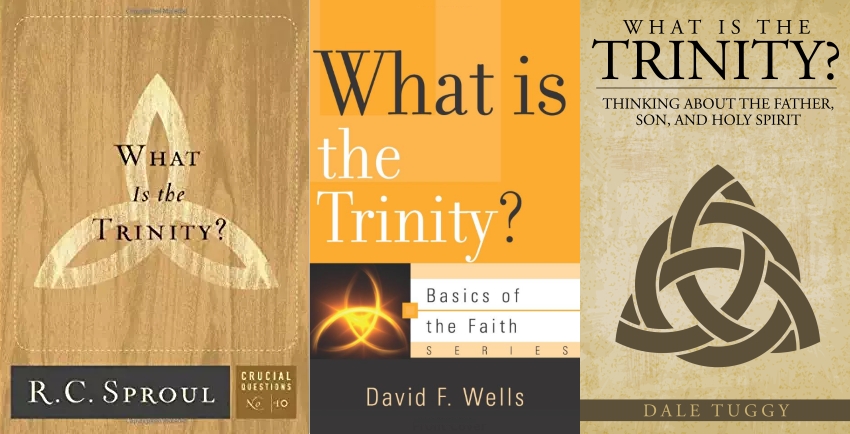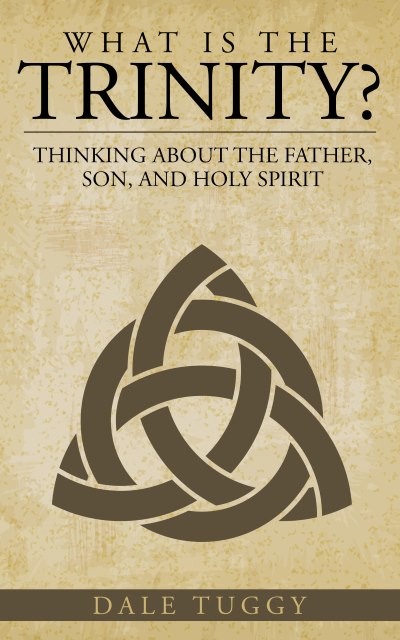Podcast: Play in new window | Download
Subscribe: Spotify | Email | RSS

Curious Christians rightly ask: what is the Trinity? This question is especially pressing for Protestants. We (it is hoped) base our theology on scripture, and yet when we look in the Bible, there is no passage which clearly lays out this idea that God is three “Persons” in one “substance.” In this episode I review three Protestant treatments.
Reader beware! I point out that the ones by Dr. Sproul and Dr. Wells suffer from some important historical inaccuracies, especially about the content and purpose of the famous 325 creed composed at Nicea.
More importantly, the two clash on what the Trinity doctrine really means. Dr. Sproul seems to say that the Trinity is one divine self with three “personae” (personalities), but later seems to say that we really can’t understand what God is three of. Dr. Wells asserts what I call a “three self” Trinity theory, on which each “Person” of the Trinity is a self. He’s not able to say, though, how this differs from tritheism! Instead he assures us that we don’t need to worry about that… for a surprising reason!
The first two books make what seem to me to be half-hearted attempts to derive a doctrine of a triune God from the Bible. (Full-hearted one here.) I don’t try this, but discuss some problems such arguments face. My book drops the pretense that the historical creeds express any one standard theology. My book tries to get the history right, and then explores how the 4th c. creed-makers must have understood the claim that the Father and Son are homousion, “same essence” or “same substance.” I also explain different Christian views on what the “Persons” are supposed to be, and relate this to the question, what sort of being should a Christian say God is. Is the one God a great, unique self, a group of divine selves, or a something-we-know-not-what? And what or who does scripture teach the one God to be? I also investigate what it means to say that the Trinity is a “mystery.” My book is a roadmap of the landscape, to help you navigate through this issue.
[spp-tweet tweet=”What is the Trinity? A triad of books reviewed!”]
Links for this episode:
- Dr. R.C. Sproul home page
- What is the Trinity? by Dr. R.C. Sproul
- Dr. David F. Wells home page
- What is the Trinity? by Dr. David Wells
- Dr. Dale Tuggy home page
- What is the Trinity by Dr. Dale Tuggy
- what-is-the-trinity.com
- Restitutio podcast Interview 24: What Is the Trinity with Dale Tuggy
- The Standard Opening Move
- podcast 164 – On Counting Gods
- podcast 97 – Dr. Michael Heiser on The Unseen Realm
- Gregory Boyd, God at War: The Bible & Spiritual Conflict
- Psalm 110:1; John 10:30; Genesis 1:26-27; Genesis 3:22-23
- “I and the Father are one.” (John 10:30) Commentary by Pastors Sean Finnegan and J. Dan Gill
- Jesus was not a Trinitarian by Sir Anthony Buzzard
- Herbert W. Bateman, “The Use of Psalm 110:1 in the New Testament“

- Robert M. Bowman, Jr. “The Biblical Basis of the Doctrine of the Trinity: An Outline Study“
- podcast 31 – Dr. William Hasker on the “Arian” Controversy
- podcast 30 – The Council of Nicea
- podcast 29 – Arius
- Rowan Williams, Arius: Heresy and Tradition
- podcast 177 – The Second Sirmian Creed (357)
- podcast 176 – Photinus of Sirmium
- podcast 175 – Marcellus of Ancyra
- podcast 174 – The First Sirmian creed (351)
- podcast 173 – Eusebius of Caesarea
- podcast 172 – The Creed of the Long Lines (344)
- podcast 171 – Assessing Athanasius and his Arguments
- podcast 170 – Athanasius’s On the Nicene Council – Part 2
- podcast 169 – Athanasius’s On the Nicene Council – Part 1
- podcast 142 – Dr. R.T. Mullins on the coherence of “classical” theism
- podcast 141 – Dr. R.T. Mullins – Is God timeless?
- podcast 108 – Dr. Robert M. Bowman Jr. on triadic New Testament passages – part 2
- podcast 107 – Dr. Robert M. Bowman Jr. on triadic New Testament passages – part 1
- podcast 16 – How is Jesus “the one Lord”?
- podcast 15 – Are Paul’s “one God” and “one Lord” one and the same?
- podcast 14 – One God, One Lord, Two Interpretations
- This week’s thinking music is “Brooks” by Kai Engel.

Great little expose’ on these books Dale. It was interesting to hear you contrast them quickly and effectively showing that they don’t really deal with the language of the trinity much. *Hint* it’s because there’s nothing on it in the Bible. But I think you knew that already.
I have an idea for a future podcast IF you’ve not done it already. There’s a lot of podcasts of yours I’ve not heard since I only recently started listening more often and picking through some old ones here and there. But if you’ve not done it already–you may want to do a more detailed explanation of the chapter in your book on “Substance Abuse.” I mean, I’ve dealt with a lot of the language claims by trinitarians and I can hold their feet to the fire but even this chapter sort of went over my head. I think it’s because the options you gave are so similar… I may have to re-read that chapter many times but it’d definitely be helpful for you to explain that subject and your options in more depth.
Thanks
At https://youtu.be/Sh72wgZEcKk you can listen to RC Sproul giving a lecture in which he unashamedly admits historical facts that undermine his entire Trinity claim.
Here are the RC Sproul quotes, referencing the minutes and seconds in the lecture:
17.10 – 17.48 “Judaism, at its core, celebrated what we call monotheism, one God. Now the problem that the early Christian church faced in dealing with her theology was that the Christian community of the first century was totally committed to monotheism. They embraced the Shema, “Hear oh Israel, the Lord your God is one.”
18.48 – 19:26 “Remember that the Christian faith grew out of Judaism, and with the embracing of Jesus, there was not at the same time – there was not a repudiation of classic, biblical monotheism. But the difficulty that the church had in understanding her faith was to reconcile the multitude of references in the Scriptures that would indicate the Bible’s teaching that Jesus was God incarnate. He shares titles that belong only to God.”
26.00 – 26.44 “…So that the deity of the Logos is clearly confessed here by John in this writing. Do you see why the church then had to go to the drawing board and say, “How can we understand this? How can someone be on the one hand identified with God, and on the other hand distinguished from God, so that you have an identity and a distinction?” And therein came the development of Trinitarian theology.”
RC Sproul admits historical facts that so many apologists and pastors do not want to face. He does not, however, “contend for the faith that was once for all delivered to the saints” (Jude 3) of the first century Christians, but contends for a later, future development of that faith, a faith that was a new “development” by the church’s use of Greek philosophies that he resorts to repeatedly in his lecture. Sproul has no restraint or objection to having the original faith mentioned in Jude 3 developed further, based on the ideas and philosophies of non-Jewish men who read the Scriptures through an entirely different frame of reference.
Great stuff KG. I remember listening to RC once tell the story about Athanasius as “contra mundum” or “against the world.” In his own time he was persecuted and only later shown to be
“right.” What a story, and we get to inherit all of that so that we ourselves don’t have to be “contra mundum” to be right as well. Because if there’s one thing that Christianity has always agreed upon ever since the 4th century, it’s that Athanasius is right.
RC and many other hugely popular religious leaders are defending established traditions rather than the clear teachings of the Scriptures, which themselves are truly contra mundum. Their call for “modern reformation” is frequently just a call to go back to the historic teachings of the first reformation, as if that was any sort of unifying or original thing. On the contrary, how could they have ever expected the Reformation to stop reforming once it had started? How can the spirit of one thing become the spirit of its opposite? How can what was contra mundum now be it’s opposite? It amazes me sometimes how they celebrate Luther almost as if he were the true founder of Christianity. They never call to go back to the original faith itself, once delivered. Whether we go back to Luther or Calvin, we’re not back at an original.
They judge whether people are in “the fold” or not by the “essentials of the historic christian faith”, which essentials they constantly disagree about as well, depending on how they view the history…. Which creed, which council, which idea, which religious leader, which tradition, which history book, which cult of personality?
Everyone’s an apologist for their own party and none have the freedom to really search the Scriptures or else they will be kicked out of their respective parties. “Fellowship” itself being based on everyone agreeing about everything, “I am of Paul, and I of Apollos.” The moment they discover that they disagree, then they bring out the axe so they can remain a one branch tree with no leaves on the ends, leaving other branches to try to grow more roots in mid air. Thus they cut off their most honest seekers. They frequently even divide their “worship services” up between the various age groups/sub-cultures which frequent their large buildings, because some prefer “contemporary” and others “traditional”, thus highlighting division as central to the way they do business. Every segment of their inherently split culture must be individually catered to, whether youth, college age, singles, young adults, or retirees.
Disinterested in the original faith once and for all delivered, rather, they assume that history couldn’t have gotten it wrong…. Yet that’s exactly what Protestantism was initially founded upon was the idea that history did get it wrong…. Why, if they are unwilling to drop their historical baggage don’t they just become Catholic, Orthodox or Coptic? Why do they continue to occupy this middle ground, luke warm and half way reformed? If the foundations are bad then the house won’t stand, so why not go one way or the other?
Yet perhaps they are standing on the same empty things that all major world religions have stood on; the established political and cultural power structures which have always been offered to religious leader throughout history. None of us founded Protestantism but we’ve inherited it from the violence of history, and it does provide a coherent structure which people can use to attain status and power throughout their lives, whether old or young, so heck, keep it around. Founding our own religions would take too much talent and too much time. “Church” is a social club with a great many benefits to those who attend and play the games it offers. Just don’t associate with the other social club down the street too closely and don’t ask too many questions after you’ve already learned to fit in.
Once upon a time they crucified Jesus for this same power game Jn. 5:41-44. The reformation’s power was clearly in the fact that it was magisterial as well. Nothing other than politics can last in this world, because mobs of people with a lie in their hands are always stronger than individuals with the truth. And yet nobody worships Artemis of the Ephesians anymore, though her system of religion worked the same way ours does, and it once caused riots. Clearly all men’s kingdoms come to an end someday, no matter how much power they once had. Some testimony.
False religious leaders have always been unwilling to step down and surrender their power and influence, even when proven false. Roman Catholicism is a safe haven for thousands of robe wearing child molesters. Unfortunately it’s not a safe haven for children, but that’s a small price to pay compared to what it would mean to dismantle “the Church”, the place where men attain rank, respect and global influence. Until death do they part, all manufacturers of idols have a business to run. It’s not personal, it’s just business. Acts 19:23-40
There are tens of thousands of denominations and mega-churches lead by delusional people. They are all “called” by God, they all have profound “testimonies” and are all bold characters with stage presence. They’d be out of jobs if they gave up their games and admitted the emptiness of their mutually exclusive, conflicting stories and the inner voices they follow around so boldly.
By contrast to all this, Jesus said that the greatest would be the least of all. He calls all of us to give up the games and to dethrone our worldly ambitions. Paul said that if he had come with words of wisdom, it would have voided the cross of Christ he was intent on preaching. What does this mean for the gospel of those who so deeply exalt the wisdom or Aristotle and Plato? Jesus made no promises that His religion would become a kingdom of the world in this age, the way the historical churches have done. Rather He said that when He returned, He would do that work Himself in the age to come. With our hopes set on His return and His coming Kingdom, we can give up trying to establish our own empires here and believe this gospel of the kingdom. The good news that someday the world will be ruled by the Messiah, and all those who follow Him, having taken up their crosses.
Comments are closed.